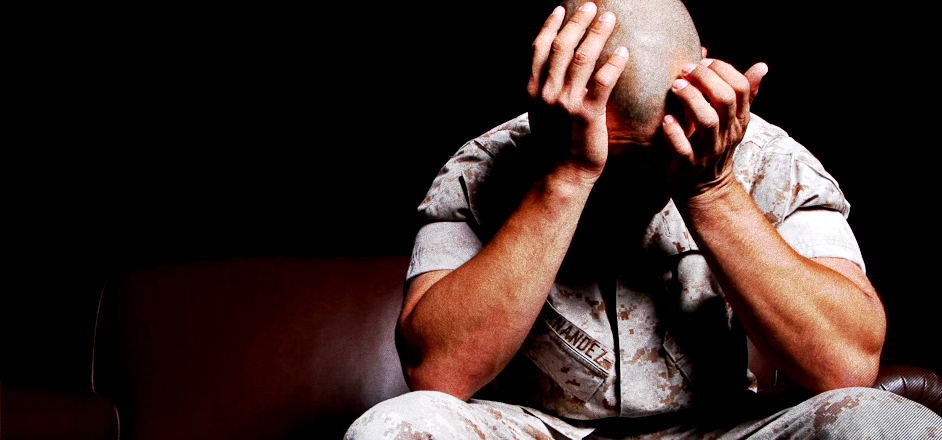Jonathan Lubecky fought with the Army in Iraq. Bombs flew at him. He killed people. And when he came home, he found that war had changed everything about his life, from the big to the small — down to how he goes to the bathroom.
One night in Balad, Iraq, he lazily stepped into a port-a-john. Just then, a bomb exploded nearby, tearing through the portable toilet and almost killing him.
Lubecky hasn't used a port-a-john since that fateful night in 2006.
"I will go against a tree and get arrested rather than go in one," said Lubecky.
Men and women who've been to war can develop irrational fears of mundane things like toilets and backfiring cars. Now, a new study confirms that some of them, including Lubecky, can be stitched back together using therapy and an illegal drug — ecstasy.
In a five-year study, nearly two dozen veterans — along with a handful of firefighters and cops — with service-related post-traumatic stress disorder were treated with a combination of therapy and ecstasy, also called MDMA, molly, X or e. It's a drug popularized by '90s raves and today's festivals.
After the study, 68 percent no longer qualified as having PTSD. And nearly everyone saw their PTSD get better. Their depression and insomnia often improved, too.
The experiment was sponsored by the Multidisciplinary Association for Psychedelic Studies, and the results are being published today in the prestigious British medical journal "The Lancet Psychiatry."
“These results are further evidence that MDMA, used just two times at monthly intervals, can make psychotherapy much more effective and better tolerated," said Michael Mithoefer, M.D., the lead author of the study, in a statement.
It has been estimated that as many as 20 percent of Iraq and Afghanistan vets have PTSD. The consequences include addiction, violence and unemployment. About 20 veterans commit suicide every day, and disability payments to them cost the government over $17 billion per year.

"I couldn't function," said Lubecky, who was diagnosed severe PTSD. He, like many vets, tried every treatment the military offered. Nothing cured him. Typical treatments for PTSD only cure about a third of veterans who try them. Lubecky said he has attempted suicide five times.
Then, Lubecky discovered this study, taking place in his home state of South Carolina.
Ecstasy fills the user with a sense of warmth, trust and well-being that allows veterans to address their problems. The scientists who authored the paper suggest that MDMA calms down the anxiety-creating parts of the brain, the amygdala and insular cortex. And it ramps up the prefrontal cortex — the rational part. With less fear and more thinking, veterans can face the scars or war.
After just three therapy sessions while on the drug, Lubecky saw his PTSD symptoms improve dramatically.
"Yeah, MDMA sounds crazy, but it works," said Lubecky, who is now employed part-time for MAPS as its Veterans and Governmental Affairs Liaison. "It's a huge deal. This is a cure."
The government agrees with Lubecky; MDMA-assisted psychotherapy has been called a "breakthrough" by the FDA. Scientific studies will continue this summer. If all goes well, the treatment is likely to be legal in 2021 or 2022, and might be used on a limited basis as early as next year.
This isn't the first time ecstasy has been used in therapy. In the late '70s and early '80s, ecstasy was celebrated as a treatment for depressed people and couples.
But it has been illegal in the U.S. since 1985, when the DEA said it was being abused. Possessing even "trace" amounts of it could lead to 15 years in prison.
Since 1986, MAPS has worked to get MDMA back into clinical practice.
The organization is doing some of its work in Boulder. University of Colorado grad James Casey is an Army veteran of Afghanistan who came back and was doing Okay — married and going to school. But he wasn't thriving. He was angry and sometimes violent.
Casey said it's tough for veterans to seek help.
"They treat PTSD like this medal or badge of honor," Casey said. Many veterans, he said, "try to self medicate with alcohol and other drugs." When Casey sought therapy, an Army buddy called him weak.
Casey was lucky. He, too, signed up for a study of MDMA therapy for PTSD with MAPS in Boulder. His experience was not included in this particular study, but he said one session on ecstasy was as helpful as a year and a half of therapy.
Casey wasn't cured of PTSD, and neither was Lubecky.
Lubecky still won't go in a port-o-potty.
But the depression and hopelessness have lifted for both men. Casey is in graduate school studying molecular biology. Lubecky works as a political consultant, helping his Iraq veteran friend Allen Chesser fight for a congressional seat in North Carolina.
Both were excited at this study's promising results. A study clearly showing that an illegal drug can help glue their psyches back together, they said, could help swing public opinion about a drug that's deeply misunderstood.
"There's this prevailing attitude in American society to treat vets with respect and give them the benefit of the doubt," Casey said.
"Almost every veteran I have talked to that has PTSD has said they want to try it," Lubecky adds. When and if MDMA therapy becomes legal, expect more veterans to give it a try. "Veterans, firefighters and law enforcement," Lubecky continues, "these are three groups of people the population will not let the government say 'No' to."



Leave a Reply